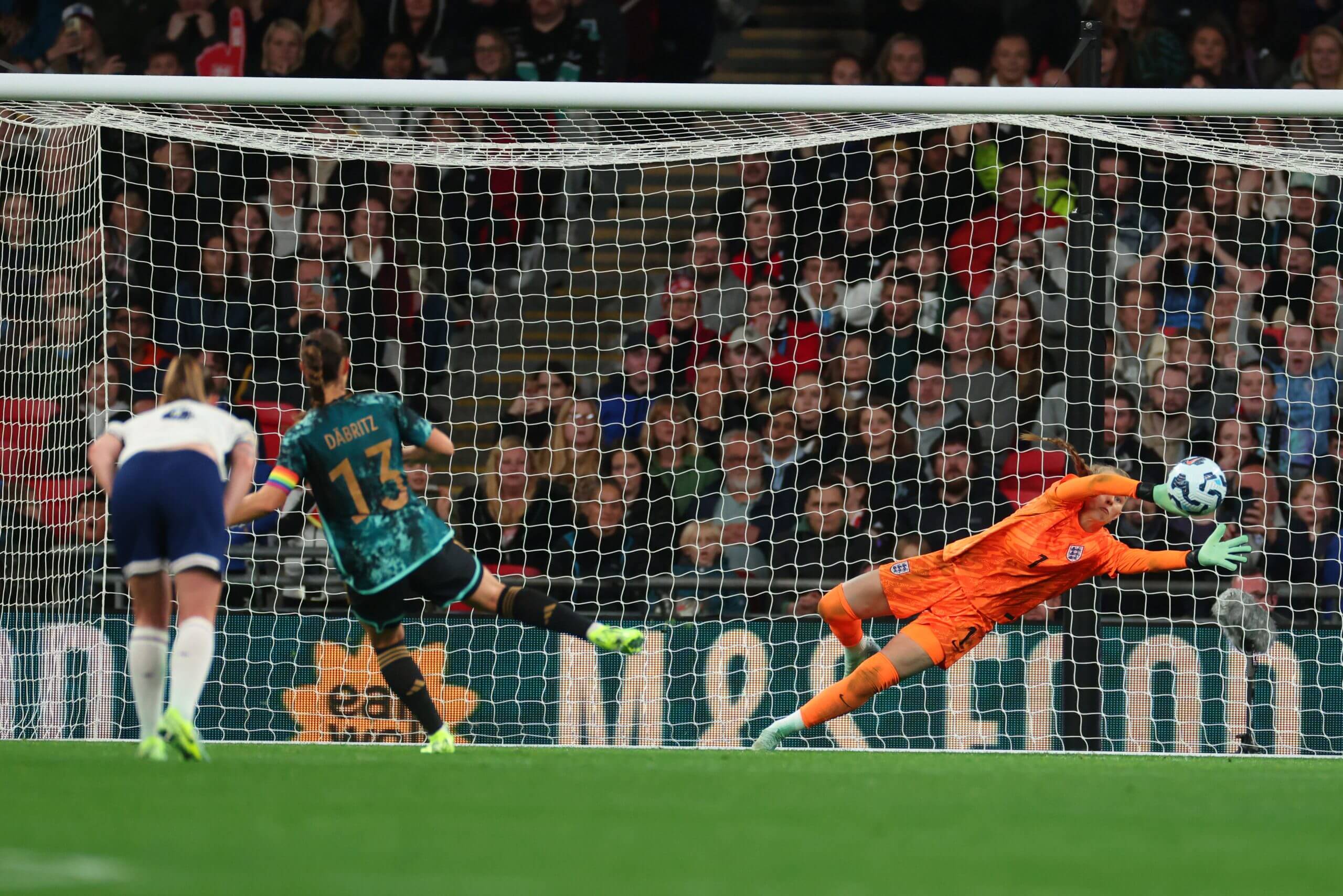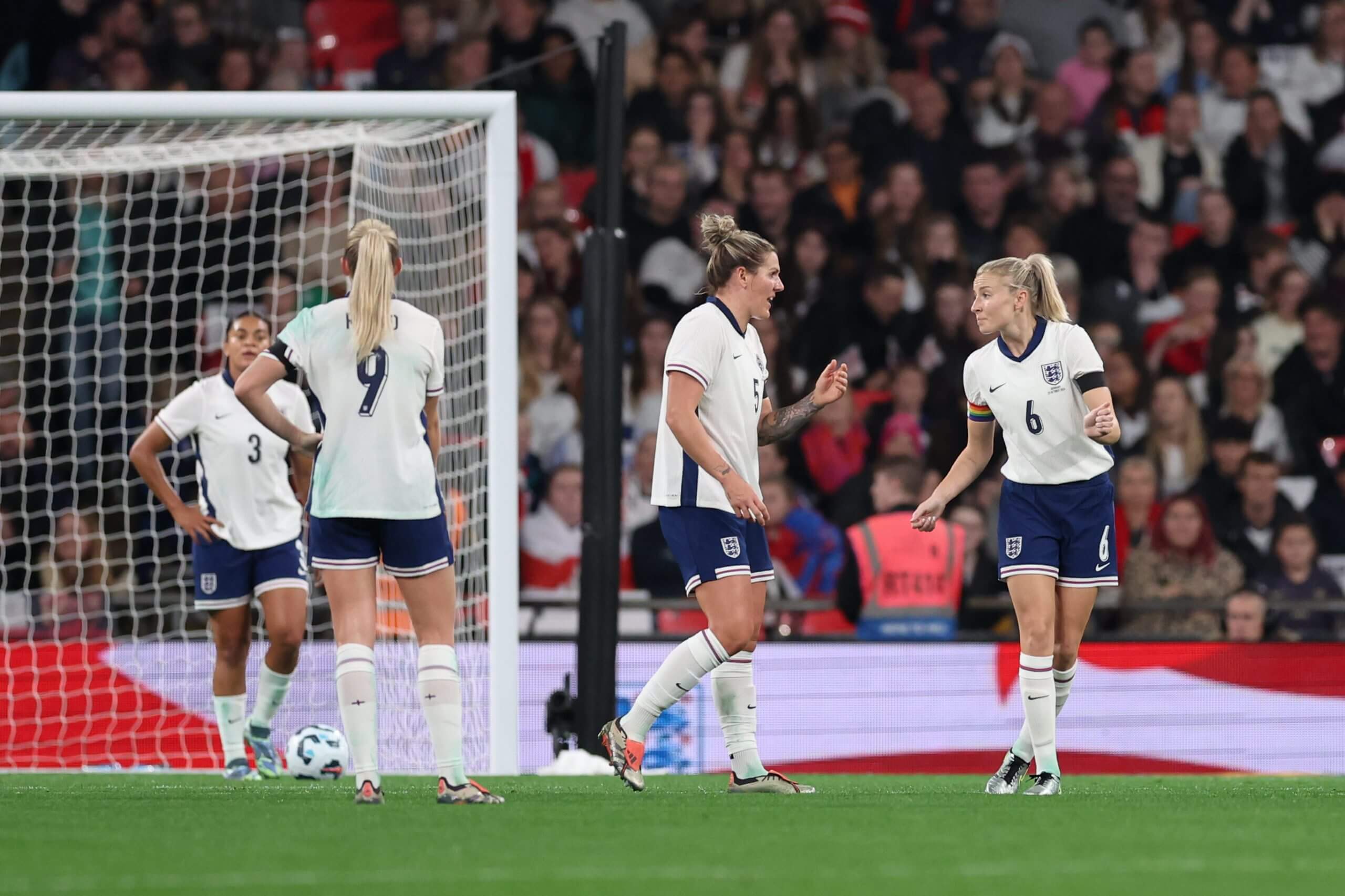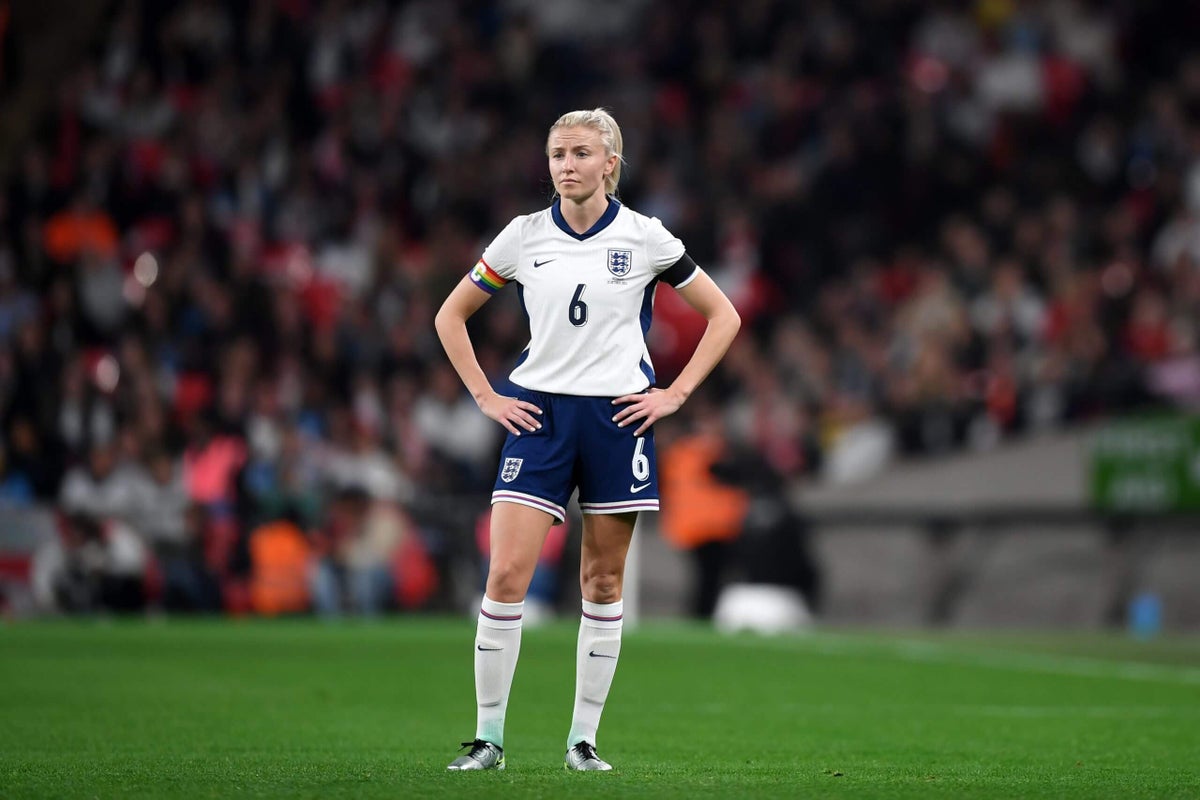By the end of the game, after seven goals, what might have been the decisive moment felt like a mere footnote.
England’s disastrous defensive performance in the 4-3 loss to Germany, the first time they had conceded four goals under Sarina Wiegman, essentially started with a misplaced pass from captain Leah Williamson inside three minutes. Germany pounced on the loose ball, and her centre-back partner Millie Bright was forced to concede a penalty. Germany took the lead and never gave it up.

GO DEEPER
The Briefing: England Women 3 Germany Women 4 – Lionesses’ attempted comeback arrives too late
In isolation, it was a simple lapse in concentration. In a wider context, it felt more significant as the team begins its preparations for the 2025 European Championship. When asked about her side’s poor defending, Wiegman was blunt.
“It started with losing the ball in moments we don’t want to lose the ball,” she said.
Having named the same starting XI for all six games of England’s victorious Euro 2022 campaign, there’s a sense that Wiegman is a loyalist — sticking to her tried-and-tested starters whenever possible. And England’s evolution over the last two years has come more from circumstance than design; fitness problems involving Williamson, Beth Mead and Fran Kirby prompted Wiegman to find alternatives. The mid-World Cup injury suffered by Keira Walsh forced her into an entire system change.

Dabritz converted a penalty kick to seal Germany’s victory. (Marc Atkins, Getty Images)
Now, England don’t have major long-term injury problems, and some of Wiegman’s key players are, for the first time, under pressure. Goalkeeper Mary Earps was omitted from the starting line-up on Friday, with Chelsea’s Hannah Hampton favoured, although she didn’t cover herself in glory.
Still, the reality is that Wiegman is more ruthless than she is often portrayed, historically content to leave big-name players out when required. Midway through her victorious Euro 2017 campaign with the Netherlands, she dropped her captain Mandy van den Berg, who was so downhearted that she withdrew from international contention after the tournament. Clearly, wearing the armband is no guarantee of keeping your spot.
As captain, Williamson has become the symbol of Wiegman’s England, but it’s worth remembering that she wasn’t even a regular first-teamer upon Dutch manager’s appointment, and her precise position in the side was uncertain going into the 2022 European Championship. The No 8 she wore throughout that competition was a sign of the fact that Wiegman’s initial plan had been to deploy her as England’s box-to-box midfielder, playing just ahead of her close friend Walsh, with Alex Greenwood at centre-back. A late change of heart meant Williamson played in defence instead, with Greenwood omitted.
Williamson’s best role was long the subject of discussion. She is an unusual centre-back, a playmaker as much of a true defender. She’s aggressive enough to play in defence, and at her best she defends well by being proactive. She’s also quick enough to cover space in behind. But she’s never been comfortable against physical, direct, traditional centre-forwards at the highest level. After missing the best part of a year with an anterior cruciate ligament (ACL) injury, she’s struggled to regain form and fitness for Arsenal and has started only one of their five matches this season. In that match, the 2-1 home defeat to Chelsea, she was given the runaround by Mayra Ramirez and made sloppy mistakes in possession too.

Williamson and Bright struggled to find a steady connection against Germany. (Catherine Ivill, Getty Images)
Williamson’s coolness with the ball at her feet is hugely impressive when she’s in form. When she’s not, that coolness can appear like complacency. A peak Williamson wouldn’t have been so troubled by being pressed by Germany’s Giovanna Hoffmann.
One complication is that she has usually played to the left of the centre-back pairing for England as she was replacing the left-footed Greenwood, and because Bright was accustomed to playing to the right for Chelsea alongside the left-footed Magdalena Eriksson. But Williamson plays to the right for Arsenal, while Bright now generally plays to the left of Chelsea’s centre-back pairing alongside Kadeisha Buchanan. It makes sense to keep them together in their usual roles, but it is very unusual to see two centre-backs playing the other way around from their usual club roles.
“We’ve spoken about that internally,” said Wiegman. “We left it now, but that’s an option to switch them.”
A right-footed left-back, Jess Carter, doesn’t help the balance either, although her defensive skill can’t be faulted. “Germany’s movement today was excellent,” she said. “That was causing us a lot of issues. They were dragging us around. We do want to be an aggressive, pressing team. Their rotation makes that a little bit hard trying to get those lines of communication right. At times it was hard to communicate because of the crowd. You can’t really hear each other so well.”
It’s gone from bad to worse for the #Lionesses 😬
Giulia Gwinn doubles Germany’s lead and doubles her tally for the night ⚽️⚽️#ITVFootball | #ENGGER pic.twitter.com/TRGBYOWJv7
— ITV Football (@itvfootball) October 25, 2024
Carter became a hugely consistent performer for Chelsea last season in the centre of defence, although she’s generally played right-back since her summer move to Gotham FC.
Defence is traditionally the area where managers experiment less than anywhere else, preferring familiarity. But Wiegman has more options in defence than ever before, partly because of a lack of injuries.
The only key player unavailable was Niamh Charles, whose development over the past 18 months has been significant and gives England a proper overlapping left-back rather than Greenwood, a centre-back pushed across, or Rachel Daly, a centre-forward at heart.
Lotte Wubben-Moy has also improved considerably over the last 18 months and was named Arsenal’s player of the season last year. Maya Le Tissier won the equivalent award at Manchester United, albeit jointly with Ella Toone.
Greenwood was probably England’s best player at the World Cup last year, and her continued omission is a surprise. She replaced Williamson after 60 minutes, in a planned move to manage Williamson’s minutes, said Wiegman afterwards. But she also acknowledged that having a left-footer brought greater balance at the back, and England could get the ball in behind more.
In fairness, Williamson has rarely let Wiegman down — only a poor performance in a 2-0 friendly defeat to Australia in April last year sticks out, aside from Friday night. And it’s not just about her. England have only kept four clean sheets in their last 18 games, the majority of which came during the period she was out injured. But having spoken about how these friendly matches are an opportunity to look at new players, even the most established players aren’t safe.
Judging by the pre-match cheers as the teamsheet was read out, Williamson remains England’s most popular player with supporters, although Earps, Toone and Alessia Russo are clearly adored too. That popularity has resulted in her being England’s most marketable player. When that is combined with a poor run of form, fans often start suspecting that sponsorship deals are taking precedence over sporting performance, as the public backlash against Emma Raducanu, briefly English sport’s golden girl, has demonstrated.
That might be unfair. But right now the question isn’t whether Williamson will lift the European Championship trophy again next summer; it’s whether she deserves a place in the England side.
(Top photo: Harriet Lander / Getty Images)
